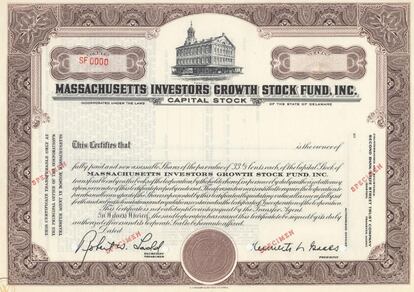How a pots and pans salesman invented an industry 100 years ago that is now worth $74 trillion
Edward Leffler created the first open-end mutual fund, democratizing investment by offering small-scale savers a low-cost financial product managed by professionals. His original fund has achieved an annual return of nearly 9.5% over the last century


Accessing an investment fund has never been easier. Neobanks like Revolut, N26 and MyInvestor have so streamlined their recruitment process that an 18-year-old can subscribe to a fund on their phone in under 10 minutes. But it wasn’t always like this. When Edward Leffler created the first open-ended, transferable mutual fund 100 years ago in Boston, the investment procedure was much slower, and hardly any protocols or controls existed to ensure that it operated smoothly. Leffler’s creation was revolutionary, and would forever change the way the wider public could get involved in stock and bond investing, a previously inhospitable terrain for the uninitiated. Today, the collective investment industry manages some $74 trillion and is one of the most important players in financial markets worldwide.
And yet, Leffler is barely a footnote in many accounts of financial history. He was not an academic or legal expert, but rather, a salesman of pots and pans. After achieving considerable financial success, the Wisconsin businessman of Swedish descent was dazzled by the buoyant market for stock sales that emerged in the interwar period.
Thanks to having sold stocks to individuals, Leffler had firsthand experience with the dearth of investment products available to small investors. In the 1920s, some closed-end funds did exist, but their managers were not required to report which companies they were buying and selling. Nor were they obliged to respond to redemption requests immediately. All this left them opaque, and oftentimes, subject to fraudulent use.
Leffler’s innovative idea was that owners of funds should be able to ask fund managers for their money back “on demand.” In other words, for fund participation to be calculated at market price, with a so-called net asset value, and for management companies to be required to give small investors their share when asked, whether that was with their remaining cash or by unwinding positions. This was a revolutionary idea that complicated fund management, but also made it more attractive.
Leffler knew he needed help to transform his notion into reality. For three years, he knocked on many doors, with no success. Finally, he visited a small Boston stock brokerage firm named Learoyd, Foster & Co., where the partners decided to back him. So was created Massachusetts Investors Trust on March 21, 1924. It had an initial capital of $50,000, invested in 45 stocks. The fund allowed nearly anyone to invest via a professionally managed product in railroad, mining and oil companies, while maintaining an investment availability that was previously unthinkable.

Benjamin Graham, considered the “father of investing” and mentor to the legendary Warren Buffett, explains in his book The Intelligent Investor that Leffler’s idea was “a purely American creation” that was “quite cheap, very convenient, generally diversified, professionally managed, and tightly regulated under some of the toughest provisions of Federal securities law.” Graham, who made a living buying and selling stocks, recognized that the fund allowed easy and accessible investments to nearly everyone.
Today, the fund’s founding firm is owned by Canadian insurance group Sun Life Financial and it manages assets worth $650 billion. Carlos Aparicio is the head of MFS Investment Management in Spain and he says that for them, “it is an honor and a responsibility to be the entity that created the first mutual fund. Also, that the fund is still fully operational.”
During its century in existence, the MFS fund has reaped an average annual return of nearly 9.5% after fees. That may not sound like much, but if you had invested $10,000 100 years ago, your principal would now be nearly $3.8 million (after adjusting for inflation). In the last 12 months alone, the fund has increased by 28% thanks to artificial intelligence, with positions in Microsoft, Nvidia, Alphabet (Google’s parent company), Amazon and Apple.
Aparicio underlines the importance of the mutual fund’s creation at the time. The Roaring Twenties were a period of great economic progress, when investment in the stock market began to gain in popularity. But the market was barely regulated, and the decade ended in chaos with the stock market crash of 1929, which is seen as the first global financial crisis. The crash hit MIT’s fund hard, and it lost 26% of its value in 1930 and 43% in 1931. Nevertheless, the seed of collective investment had been planted.
Sign up for our weekly newsletter to get more English-language news coverage from EL PAÍS USA Edition
Tu suscripción se está usando en otro dispositivo
¿Quieres añadir otro usuario a tu suscripción?
Si continúas leyendo en este dispositivo, no se podrá leer en el otro.
FlechaTu suscripción se está usando en otro dispositivo y solo puedes acceder a EL PAÍS desde un dispositivo a la vez.
Si quieres compartir tu cuenta, cambia tu suscripción a la modalidad Premium, así podrás añadir otro usuario. Cada uno accederá con su propia cuenta de email, lo que os permitirá personalizar vuestra experiencia en EL PAÍS.
¿Tienes una suscripción de empresa? Accede aquí para contratar más cuentas.
En el caso de no saber quién está usando tu cuenta, te recomendamos cambiar tu contraseña aquí.
Si decides continuar compartiendo tu cuenta, este mensaje se mostrará en tu dispositivo y en el de la otra persona que está usando tu cuenta de forma indefinida, afectando a tu experiencia de lectura. Puedes consultar aquí los términos y condiciones de la suscripción digital.








































